'The Night Manager' Postmortem: Inside the Premiere of the Tom Hiddleston-Hugh Laurie Spy Thriller
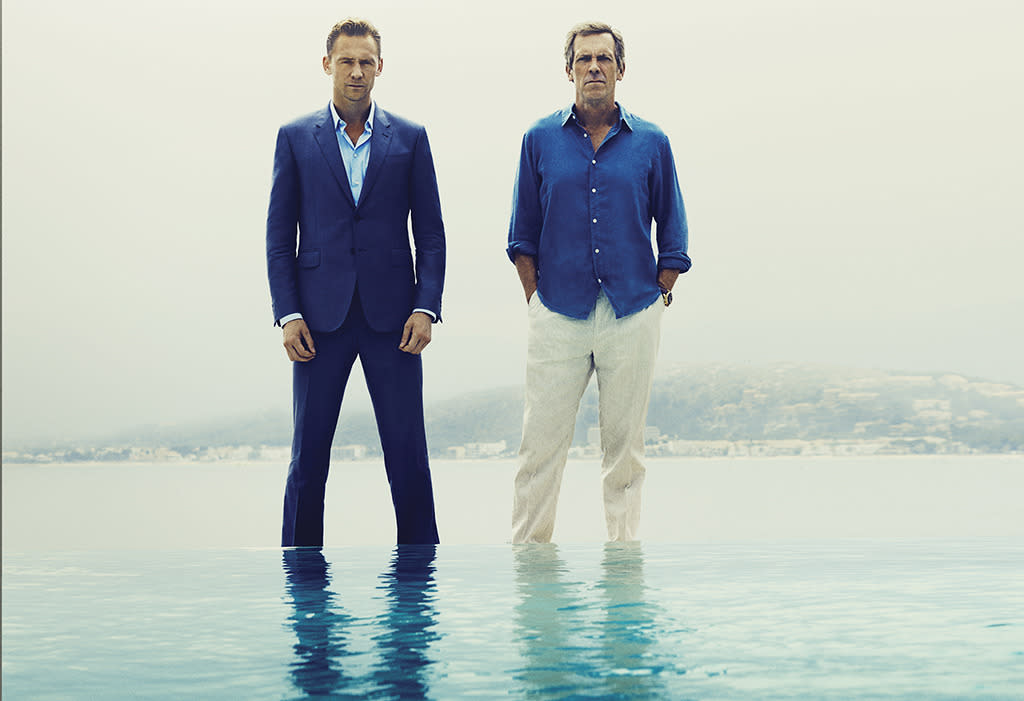
Now that The Night Manager, the six-part miniseries adaptation of John le Carré’s 1993 novel, has premiered stateside on AMC, American audiences are discovering what the Brits already know: the casting is perfect. Tom Hiddleston stars as Jonathan Pine, a former British soldier who’s hiding behind a counter in a stunning hotel in Cairo, Egypt when a guest’s request for him to photocopy documents sets him on a collision path with “the worst man in the world,” Hugh Laurie’s charming, untouchable Richard Roper — a billionaire who pretends to be an philanthropist when he’s actually an international arms dealer.
To break down the premiere, Yahoo TV spoke with Stephen Garrett, an executive producer who boarded the project right after Hiddleston and Laurie were cast but before the character who encourages Pine to become a spy and infiltrate Roper’s inner circle was switched from a man, as in le Carré’s novel, to a woman, as played by Broadchurch’s Olivia Colman.
Related: ‘The Night Manager’ Review: ‘The Night Manager’: Very Good Spy vs. Really Bad Guy
Why do you think Hugh and Tom are the perfect Roper and Pine?
If we start with Hugh… he’s said, “People have been kind enough to suggest that it’s a great performance on my part, but the truth is, I’ve been practicing being evil for the past 20 years, so it really comes quite naturally!” There may be an element of truth in that, but I think in all seriousness, what’s been fascinating being a Brit of roughly the same age, is watching him emerge from Cambridge Footlights, the sketch-based comedy on the BBC with Stephen Fry, and then comedic acting in Jeeves and Wooster, and then, I don’t know if you’ve heard of a show called Spooks, but I sort of grew my first British independent company on the basis of that show, which played in the States as MI-5. It’s a spy show inspired by le Carré. But Hugh, oddly, was in our first season of that playing a very roguish, as the term is used in The Night Manager, “River House” officer.
He was in three episodes of that and was so brilliant! It was the first serious role he played, really. He was superb. Again, oddly, slightly Roper-ish, I would say, because there was a satanic streak running through him. We loved him and had written him in to be a temporary character, but when we got greenlit for a second season, we said to him, “Would you be prepared to come back?” And he said that he was just off to LA to do a pilot for some silly medical show that would probably never happen. And guess what that was? So that was the last time we saw him.
What was clear to us is that he’s a hugely talented actor. He’s so smart, and you can see that brooding intelligence bubbling beneath the surface, whether he’s speaking or not — particularly when he’s not speaking. There’s just so much going on in that head. He communicates in the most extraordinarily vivid way.
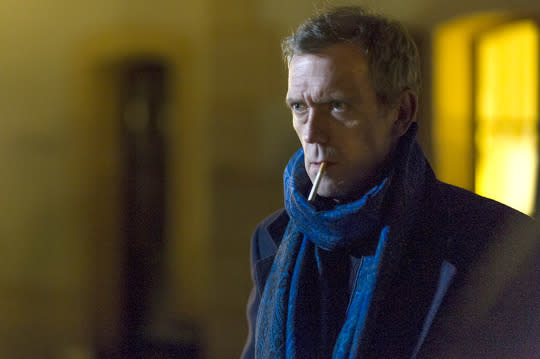
To the part of Roper itself… le Carré uses the same phrase in the book that you’ve heard in the show which is, “he’s the worst man in the world.” For a man who’s so articulate, it’s an oddly childish phrase to use. It sets an extraordinarily high bar. If you read the papers every day, to be the worst man in the world you’ve really got to be something. There’s many world records being set daily. The other thing is, if you just make Roper bad, you have a cat-stroking Bond villain. That isn’t something we wanted. We wanted to create for Hugh a part that would allow him to darken and darken as the series unfolds, but when you meet him, he’s smart, charming, fun to be with — you not only like him and his entourage, you want to be at dinner with him. That was always what we set out to do and what Hugh embraced: to create a character who was the life and soul of the party. Intelligent with it. Whatever you knew about his activities, and you know pretty quickly he’s not a good man, you still can’t help but think, “I’d love to spend time with this man and if there’s a dinner, I want to be next to him.”
Hugh is so naturally charming, that’s what he brought to the show. I can’t think of anyone who is as charming as that. You think of someone like Clooney, I suppose, but then what Hugh can also do — which I’m, with respect, not sure George Clooney can do, though I’d like to see it — is terrify you with a sense of absolutely spine-tingling darkness and evil. Which is what happens [in later episodes].
For Hugh to straddle those two worlds… even in the last episode, there are moments where he is still unbelievably charming. And you think, “Do I really hate him? Do I really think he’s the worst guy in the world and deserves whatever fate awaits him? I still maybe would like to have breakfast with him at the Nefertiti Hotel.”
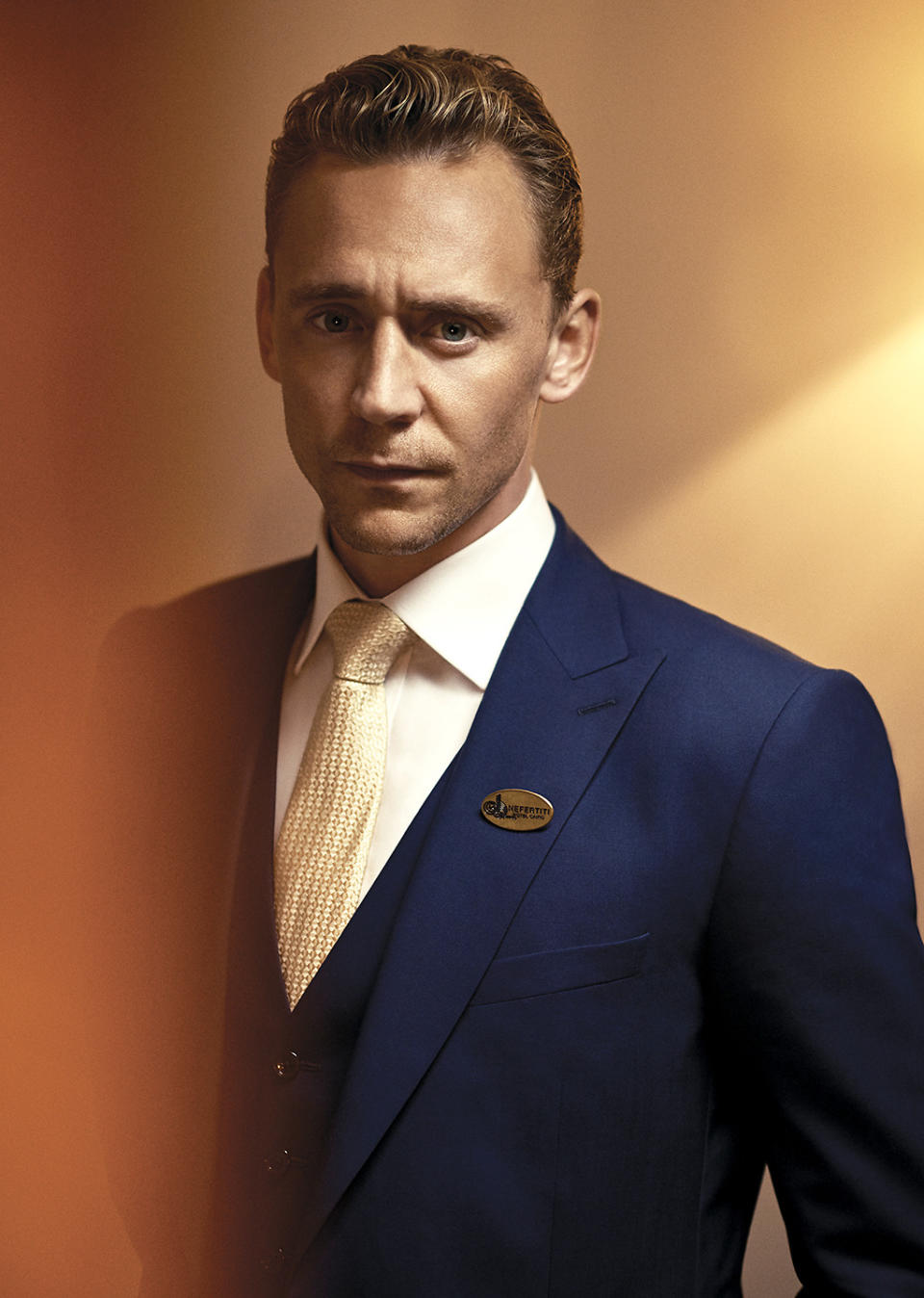
What was the key to Tom’s portrayal of Pine?
Spy thrillers, I think, are very challenging stories when translated from the novel to the screen. What le Carré is brilliant at, why his stories excel, is they’re inspired by his love of Graham Greene — layers of psychological and emotional complexity that draw you inside the psyche of the character. It’s not really just about the architecture of the story, it’s about what’s going on in these people’s minds and souls.
A novelist can do that. A novelist can just say, “What he was thinking was this!” Although, if you’re le Carré, you do it more articulately than I’ve just done it. What happens on screen in bad versions of that is you just get some plank of an actor looking like a piece of wood and desperately trying to convey some intelligence or complexity and simply just looking blank. When you have someone like Tom Hiddleston and a good script… Pine’s a man of few words, he’s constantly watching. His face is absolutely mesmerizing, because you can just see so much going on behind the eyes. To communicate in utter stillness something so compelling is a remarkable gift, and it’s what distinguishes Tom from almost any other actor of his generation. Pine, in lesser hands, would just be dull. In Tom Hiddleston’s performance, he’s completely seductive, beguiling, and he makes you believe you know what’s going on inside his head even when you don’t.
I did notice that. Especially with this first episode, there are a lot of shots of him standing, sitting, lying down just watching, looking, thinking.
Yes!
I counted 16.
There’s scenes in Zermatt, for example, where it’s almost wordless. Those first few scenes. He greets his fellow workers. He putters around turning lights off. Nothing’s happening and it’s still really — obviously I’m biased, but assuming it worked for you — compelling!
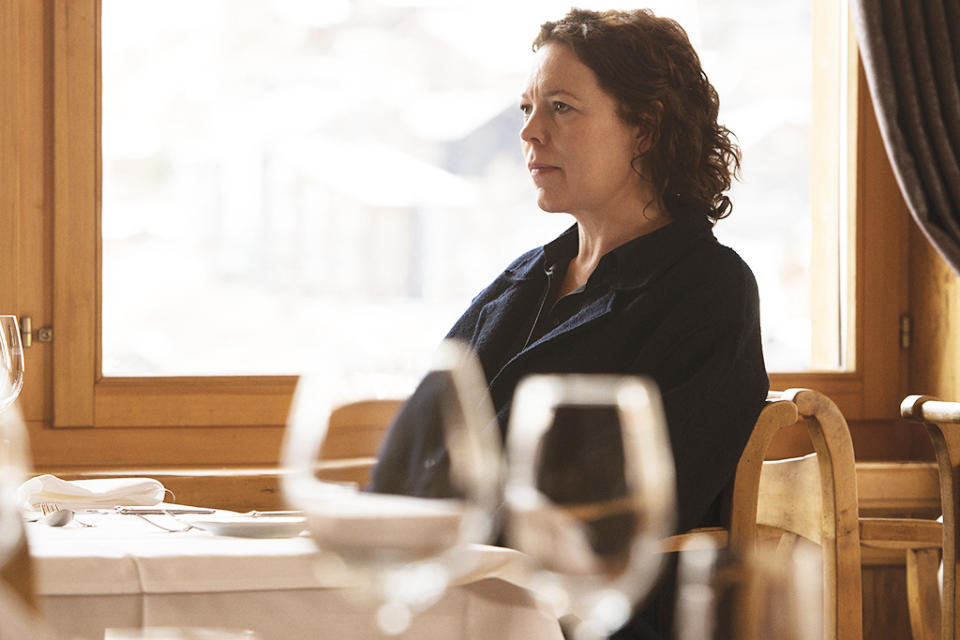
Let’s move on to Olivia Colman, who is equally wonderful in her role. In the novel, that character is Leonard Burr. Do you know the initial spark to change that character to Angela Burr?
I do! That was a conversation I was a part of from the get-go. When I came to the project, we had two first drafts of the first two episodes and Burr was still a man. This was a decision made quite late. My feeling was that although when le Carré wrote the novel 25 years ago his portrait of a very male, very British world was entirely authentic, now that we’re in the second decade of the 21st century, it didn’t feel in touch with the time. As we know, there are many very brilliant and powerful women at the heart of government and security services. The lack of a powerful female presence in the story just felt like a lack.
We had conversations amongst the few of us, with my fellow executive producers [including le Carré’s sons Stephen Cornwell and Simon Cornwell and series writer David Farr], and more and more came to the conclusion that if someone was going to have a sex change, it needed to be Leonard Burr. As soon as we’d had that epiphany, the whole thing felt so much more interesting. Because you’ve got this woman who, just by definition in this dangerous world, is more vulnerable than her male equivalent would have been.
Related: ‘The Night Manager’: Tom Hiddleston and Hugh Laurie Talk Their Deadly But Charming Face-Off
I remember my first conversation with [series director] Susanne Bier before we committed to one another. I approached Susanne, and I Skyped her from my kitchen. She was in her library, and we had an hour-long conversation. I raised with her the possibility that Burr might become a woman. She’d read scripts with Burr as a man. She, of course, leapt at it. That was completely thrilling for her. As soon as we had that conversation, she said, “There’s only one woman that could play this and that’s Olivia Colman.”
We had a short list of one for the role of Angela Burr. That didn’t give us a very strong negotiating position, so we didn’t tell Olivia that. When Susanne and she met, Olivia said, “Well, I’d love to do it, but you should know I’m already quite pregnant, and by the time we film, I’m going to be very pregnant. Is that okay?” Susanne thought that in story terms, that was actually even more exciting. Because this additional vulnerability of a woman clearly heavily pregnant, and given the jeopardy into which she falls later in the story, it’s terrifying really.
The challenge we had then was talking to our insurers, because for insurers, sending a very pregnant woman to Morocco oddly wasn’t something that excited them terribly much. They thought that might be a bit risky. We had a really wobbly few weeks as we negotiated with our insurance company who, to their great credit, though it cost us some money, decided this was okay. We stuck with it. Thinking at one time that we might lose Olivia, we wrote the part as not just a woman, but a pregnant woman. Even if we lost Olivia, that was a bit of story we thought was so brilliant and added value, we’d keep it.
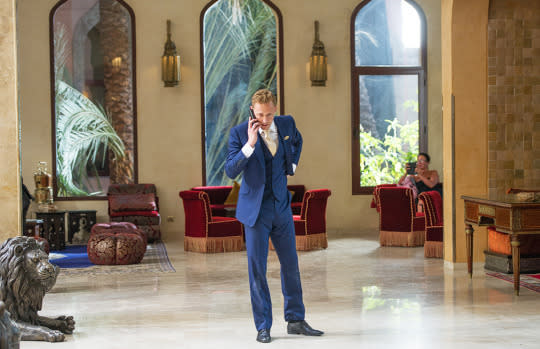
Speaking of Morocco, one of the stories I’ve enjoyed hearing as the cast and crew have done the panel circuit leading up to the premiere is how some guests at the working hotel that stood in for the Nefertiti [the Es Saadi in Marrakech] actually thought Tom was the real night manager.
We were shooting these scenes at the hotel, wide shots, and the crew was a long way from the set. There was really no sign of the crew. We were actually at the other side of the reception area. In the course of a four-hour sequence, eight separate sets of people tried to check in with Tom thinking he was the real night manager. They were somewhat perplexed when he said, “I know I look like the night manager but you’re going to have to talk to…” because we moved the real reception over to a corner where we weren’t filming. But people really were utterly baffled. Particularly in many cases when they didn’t speak English, they were uncertain why this apparent official of the hotel was being so unhelpful.
I was wondering why people didn’t recognize him. That could explain why they were not as familiar with his work.
I think he’s also best known as Loki in Thor where his hair’s a different color and he isn’t dressed as a night manager. I think people can be thrown by that. … When producer Rob Bullock and I first met with Tom, we said to him, because we knew he was meticulous in his preparation, that if he wanted it we’d arrange for him to spend a night in a hotel as a night manager. So we hooked him up with the Rosewood hotel in London, and he really had a hugely enjoyable and educational time shadowing the real night manager but also being the night manager, dealing with one room at three in the morning complaining about noise being made in another room. If you remember in Zermatt, when the bodyguards come down late and say, “Is the bar still open?” and he goes over to them and says, “Of course, gentlemen, let me show you the way” — that was a trick he learned at the Rosewood. He learned that when people ask for directions in a [luxury] hotel, you don’t just point, you show them the way.
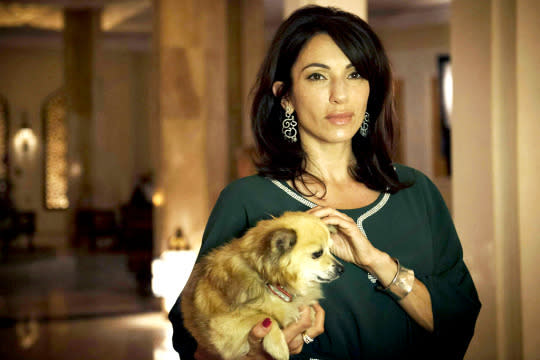
Obviously the key, motivating scene in episode 1 happens at the hotel, when Pine finds Sophie Alekan (Aure Atika), mistress to Roper’s local middleman, Freddie Hamid (David Avery), has been killed in her suite for being a leak. I want to talk about her dog being by her body, covered in blood. What do you remember about filming that?
I certainly remember a lot of conversations about the dog. We had three choices: One choice was, should the dog be there? Another choice was, should the dog be as you saw it — there, but covered in blood? The final choice was, should the dog be killed?
I’m glad you didn’t do the last one, as you could hear from my gasp.
Here’s the thing. I’ll tell you one of the reasons we didn’t kill the dog: a lot of people care more about animals than they do about humans. We didn’t want to take away from the emotion of the death of Sophie.
Good call.
Thank you.
Some people might wonder why Sophie comes back to the hotel after Pine told her fleeing to London wasn’t an option and he’d need more time to figure out how to protect her. Is it because she’s going to try to convince Freddie that she knows nothing? Does she just think there’s no place else to run, so she might as well get this over with? What do you think was her motivation to come back to the hotel at that time?
I think it’s all of the above. I think she thought she’s a woman alone. She’s got nowhere else to go. There’s something fatalistic about her from the moment she gives Pine those papers. She knows what’s going to happen. It’s a kind of death wish. You’re right to ask the question. It’s one of those areas of what we hope is intriguing ambiguity and not confusing. I think a lot of people do things that are in hindsight baffling given what happened, but she has no choice but to try and ride it through.
After Sophie’s death, the episode flash-forwards four years to Switzerland. Is it a coincidence that Pine happened to be at that hotel (with views shot at Zermatt’s Riffelalp Resort 2222m), or had he somehow figured out that Roper used to come there and was waiting for that chance?
It’s a coincidence. It’s taken from le Carré’s book. He’s run away. He’s ashamed of what’s happened to Sophie. He’s locked himself away from the world. That moment of fate, when Roper returns to his life, he knows he has no choice but to act. It’s the gods telling him he can’t run away and has to do something.
The Night Manager airs Tuesdays at 10 p.m. on AMC. Come back to Yahoo TV after each episode for a postmortem with executive producer Stephen Garrett.


